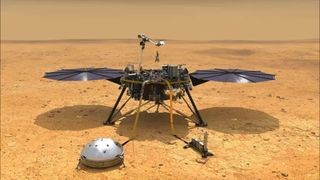MARSQUAKE

Disclaimer: Copyright infringement not intended.
Context
- The strongest-ever quake to violently shake Mars arose not because of a crashing asteroid but rather the tectonic forces within the planet itself, scientists reported
- The new findings show the Red Planet is more seismically active than previously thought.
Details
Background
- InSight Mission: The InSight lander, deployed on the Martian surface, detected a magnitude 4.7 Marsquake in May 2022, surpassing the previous record of magnitude 4.2 recorded in 2021.
- Seismic Activity: The InSight mission has identified over 1,300 marsquakes, with some traced to asteroid impacts. However, the recent significant quake raised questions due to the absence of expected indicators associated with asteroid impacts.
Recent Findings
- Tectonic Origin: After an extensive investigation, scientists concluded that the May 2022 Marsquake was tectonic in origin, suggesting that Mars is more seismically active than previously believed.
- Causes of Marsquake: The quake is thought to have resulted from the release of billion-year-old stresses within Mars' crust, attributable to the planet's cooling and shrinking processes over time.
- Implications: These findings challenge the conventional view that Mars, being smaller and colder than Earth, lacks tectonic activity. Understanding the distribution of stress within the planet's crust is essential for potential future human missions to Mars.
Scientific Significance
- Insights into Martian Geology: The discovery provides crucial insights into the geological processes and internal dynamics of Mars, enhancing our understanding of its geological history and evolution.
- Potential Human Missions: Understanding the distribution of stresses within the Martian crust is crucial for identifying safe areas for potential human habitation and exploration.
About
Overview:
- Marsquakes refer to the seismic activity or quakes occurring on the planet Mars.
- Similar to earthquakes on Earth, these seismic events result from the release of energy accumulated within the Martian crust, causing the ground to shake and vibrate.
Characteristics:
- Seismic Waves: Marsquakes produce seismic waves that can be detected and analyzed by seismometers, providing crucial information about the interior structure and composition of Mars.
- Magnitude: Marsquakes can range in magnitude, with some being relatively minor tremors and others producing more significant shaking.
Detection and Study:
- InSight Mission: The InSight (Interior Exploration using Seismic Investigations, Geodesy, and Heat Transport) mission, launched by NASA in 2018, includes a seismometer designed to detect and record Marsquakes. This mission has provided unprecedented insights into the Martian interior.
- Seismic Monitoring: Seismometers measure the motion of the ground caused by Marsquakes and help scientists understand the composition, layering, and tectonic activity of Mars' crust and mantle.
Scientific Significance:
- Planetary Evolution: Analyzing Marsquakes helps scientists understand the geological processes that shaped the planet's surface and interior over time, providing clues about its early geological history and evolution.
- Internal Structure: By studying seismic waves, scientists can infer the internal structure of Mars, including the thickness and composition of the crust, the properties of the mantle, and the potential presence of a liquid or solid core.
- Tectonic Activity: Marsquakes can provide insights into the tectonic activity and potential volcanic processes that might still be active beneath the Martian surface.
Comparison with Earthquakes:
- Differences in Intensity: Marsquakes are generally less intense than earthquakes, as Mars is a much less geologically active planet compared to Earth.
- Geological Context: Understanding the differences between Marsquakes and earthquakes provides valuable comparative data for studying the geological evolution of both Earth and Mars.
Conclusion
The recent findings underscore the need for continued research into Martian geology and seismic activity, paving the way for a deeper understanding of the Red Planet's potential for sustaining human life and future exploration endeavors. Studying Marsquakes is instrumental in deepening our understanding of the Red Planet's geology, history, and potential habitability, contributing to future human exploration and possible colonization efforts on Mars.
|
PRACTICE QUESTION Q. Discuss the similarities and differences between Marsquakes and Earthquakes. How do the recent discoveries of Marsquakes challenge our understanding of the geological processes on Mars? (250 Words) |




.jpg)
1.png)
